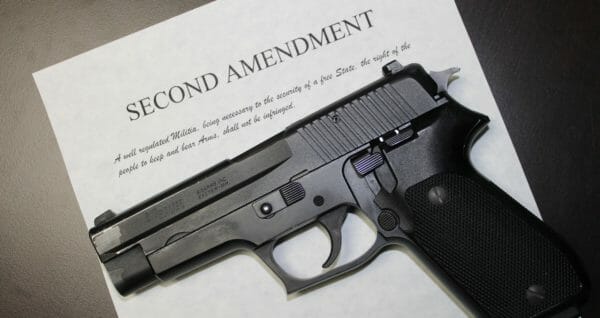
U.S.A. — Related to a recent article about how Judge Roger T. Benitez is working hard on defending the Second Amendment of the U.S. Constitution against numerous infringements created by the California government, a poster wrote:
Working hard.?? What is it, like twenty-seven words.?
A well regulated Militia, being necessary to the security of a free State, the right of the people to keep and bear Arms, shall not be infringed.
Many Second Amendment supporters feel similar frustrations. Sometimes the complaint is shortened to four words: …” shall not be infringed“!
Perhaps the most famous case where a judge simply quoted the Second Amendment was the case of U.S. v Miller, brought to the Supreme Court in 1939 by the anti-Second Amendment Roosevelt administration with the connivance of the Roosevelt-appointed anti-Second Amendment judge Heartsill Ragon. From a previous AmmoLand article:
Then in 1939, the Miller case was set up by Heartsill Ragon. Ragon was an anti-Second Amendment ideologue and a President Franklin Delano Roosevelt (FDR) ally appointed from Congress to the federal judgeship. The case went to the Supreme Court without opposing counsel or briefs. The Supreme Court refused to rule on whether a sawed-off shotgun (having not been presented with any evidence to the contrary) was an arm protected by the Second Amendment.
The problem with simply saying “What is it, like 27 words?’ or “Shall not be infringed” is the primary power of leftists/progressives has always been the power to control the language by insisting on their definitions and their interpretations of language. The Progressive response to the Second Amendment has been “it is a collective right,” not an individual right, or that “the people” mean only state governments or consists of those people which governments allow to exercise the right through permits and other means.
The words “shall not be infringed” beg the question: What shall not be infringed? The answer is almost always” “The right to keep and bear arms.”
So the question becomes: What does the right of the people to keep and bear arms mean? You may think you know the answer. So do Progressives. So does Senator Schumer. The Constitution is a legal document.
The sensible way to determine what the words of this legal document, the Constitution, mean is to determine what they meant to the parties who agreed to the document when the document was created and ratified.
This doctrine is known as originalism. Originalism is the doctrine now dominant at the Supreme Court. For most of the last 90 years, the dominant doctrine at the Supreme Court has been that of a “living Constitution”, created by Progressive ideology. Progressive ideology holds the Constitution should be held to mean whatever wise judges choose it to mean, at the instant they rule, for the benefit of the country (as long as the judges are Progressives). Progressive ideology is all about empowering the government to do what it wants or claims it needs to do.
With a Supreme Court finally returning to originalism as the correct way to interpret the Constitution, the hundreds of pages of briefs on the meaning of the Second Amendment are all about showing what the operative clause of “the right of the people to keep and bear arms, shall not be infringed” meant at the time of ratification. There is a sprinkling of what the prefatory clause “A well regulated militia, being necessary to the security of a free state” means. The arguments about the militia clause are less heated because the prefatory clause does not limit the operative clause, as understood at the time of ratification and in common English language construction.
When your opponents are expert at twisting words, when they control most of the media, the universities, and much of the drivers of popular culture, you have to be careful and precise with your arguments. This is where Judge Benitez has excelled. His arguments are beautiful renditions of logic and reason.
It would be a wonderful thing if those who oppose an armed population agreed on the definition of words, if they were proponents of logic and reason, and if they never lied or acted in bad faith. It would be wonderful if the dominant media could be trusted to report honestly and without bias. We cannot rely on the opponents of an armed population, to be honest, to use common definitions correctly, or to report honestly.
For those reasons, more words than merely the 27 words of the Second Amendment or the four words “shall not be infringed” are needed to make the case in court. Explaining what the Second Amendment meant at the time of the ratification of the Second Amendment takes more than a few pages when opposed by people who refuse to be bound by common definitions, logic, reason, ethics, or morals.
About Dean Weingarten:
Dean Weingarten has been a peace officer, a military officer, was on the University of Wisconsin Pistol Team for four years, and was first certified to teach firearms safety in 1973. He taught the Arizona concealed carry course for fifteen years until the goal of Constitutional Carry was attained. He has degrees in meteorology and mining engineering, and retired from the Department of Defense after a 30 year career in Army Research, Development, Testing, and Evaluation.

from https://ift.tt/Yyj2ti7
via IFTTT

No comments:
Post a Comment